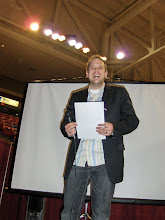
The issue of copyright is HOTLY debated in the nerd/hacker/pirate community. In my experience, I've run across all types of copyright issues, both legal and ethical, and it's very hard to know where the line is.
My first computer, an IBM PS/2 given to me back in 1997 had DOS running on it. For those of you who don't know but care enough to wonder, DOS is what Windows is based on. The only difference is that DOS doesn't have any sort of Graphical User Interface, or GUI. Instead, the user has to type commands to make the computer do anything.
As you can imagine, this was unacceptable to an impatient pre-teen like me. I wanted it to work by itself, without the need to have me type commands. I wanted Windows. My neighbor happened to share my enthusiasm for computers with me, and he lent me his copy of Windows 3.1. It was spread across 13 floppy disks, but it was Windows and it was free. I installed it without a second thought, and thus began my pirated computing career.
When I first started downloading "free" music back in 2000, it never even occurred to me that what I was doing could be considered stealing. Even after my dad explained it to me, I still felt that what I was doing was not wrong. I felt that I had been provided with a solution to a flawed industry. When I was in high school, a movie would get released to the theater, play for maybe a month, and then it would disappear for a year or more until it was released on videotape or DVD.
"Why," I thought, "would an industry do something so stupid? Why make us wait over a year to see the movie in our own homes? Why punish us instead of embracing us when we find a way to do it without your help?"
This mindset carries over very well into the music realm as well. I think it's ridiculous that companies will sell us a song with Digital Rights Management (DRM) attached to it so that we can only listen to it on one computer, but not on a CD or portable music player. Additionally, if my computer breaks and I get a new one, the DRM restrictions prevent me from listening to the song that I OWN on my new computer! I think the copyright law in the US needs a lot of change.






